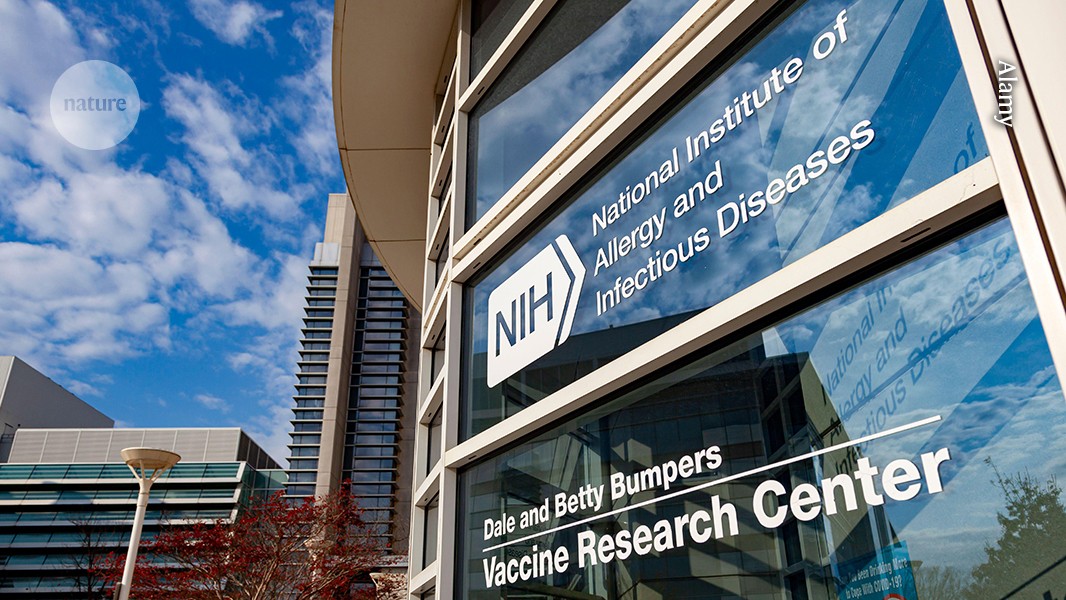‘Never seen anything like this’: Trump’s team halts NIH meetings and travel

In an unprecedented move, research-grant reviews have been suspended indefinitely at the world’s largest public funder of biomedical research

A vaccine research centre on the campus of the National Institutes of Health in Bethesda, Maryland.Credit: Alamy
Confusion and anxiety is rippling through the US health-research community this week following Donald Trump taking office as the 47th US president. His administration has abruptly cancelled research-grant reviews, travel and trainings for scientists inside and outside the National Institutes of Health (NIH), the world’s largest public biomedical funder. Adding to the worry: the Trump team appears to have deleted entire webpages about diversity programmes and diversity-related grants from the agency’s site.
The cancelling of meetings and travel is part of a pause in external communications issued on 21 January by the NIH’s parent organization, the US Department of Health and Human Services (HHS). Researchers who spoke to Nature say that although a short, daylong pause in communications at US agencies has occurred in the past when new administrations have started, to reorient strategy, the reach and length of the Trump team’s — it is set to last until at least 1 February — is unprecedented. Without advisory-committee meetings, the NIH cannot issue research grants, temporarily freezing 80% of the agency’s US$47-billion budget that funds research across the country and beyond.
“I’ve never seen anything like this before,” says Carole LaBonne, a developmental biologist at Northwestern University in Evanston, Illinois, who has received funding from the agency for more than 20 years. The uncertainty caused by the pause will be “devastating for the scientific community”, particularly for early-career researchers, LaBonne adds.
The pause includes “mass communications and public appearances that are not directly related to emergencies or critical to preserving health”, according to an NIH spokesperson. “This is a short pause to allow the new team to set up a process for review and prioritization.”
NIH and HHS spokespeople did not respond to queries about whether grant-review panels were considered public appearances and why they were cancelled, or about concerns from researchers that the pause will hinder the agency’s mission.
A mission under threat?
Typically, the NIH awards research grants after two separate panels of independent specialists in a particular scientific field have reviewed project proposals. On Wednesday, reports emerged on the social-media platforms X and Bluesky that grant-review panels scheduled prior to 2 February had been cancelled without any indication of when they would be rescheduled.
These panels, called ‘study sections’ and ‘advisory councils’, are sometimes scheduled a year in advance and can include more than 30 participating researchers, so it will take time to reschedule and might result in a ‘domino effect’ of cancellations. Researchers awaiting a grant-review decision “may be laid off or forced to seek employment elsewhere if funding is uncertain or delayed”, LaBonne says. Early-career researchers are particularly at risk, “as it can mean missing research milestones and jeopardize hiring, promotion and tenure decisions”, she adds.
Harold Varmus, a former NIH director who is now a cancer researcher at Weill Cornell Medicine in New York City, says that putting a hold on communications of new policies when there’s a new presidential administration can make sense. But the extensive remit of the current pause is counter to the agency’s mission, he says. The US Congress allocates budget money to the NIH for funding research, he adds, so “the will of Congress will be challenged if we don’t change what is going on”.
Esther Choo, an emergency-medicine physician at the Oregon Health & Science University in Portland, wrote on Bluesky on 22 January that a study section she was supposed to participate in was cancelled this week. As a reviewer on grant proposals, she said, you constantly read ideas for research projects that could be “a game changer in health”. She added: “I hope we get back on track soon. There are real people, real lives waiting on the science.”
Enjoying our latest content?
Login or create an account to continue
- Access the most recent journalism from Nature's award-winning team
- Explore the latest features & opinion covering groundbreaking research
or
Sign in or create an accountdoi: https://doi.org/10.1038/d41586-025-00231-y
This story originally appeared on: Nature - Author:Max Kozlov


















